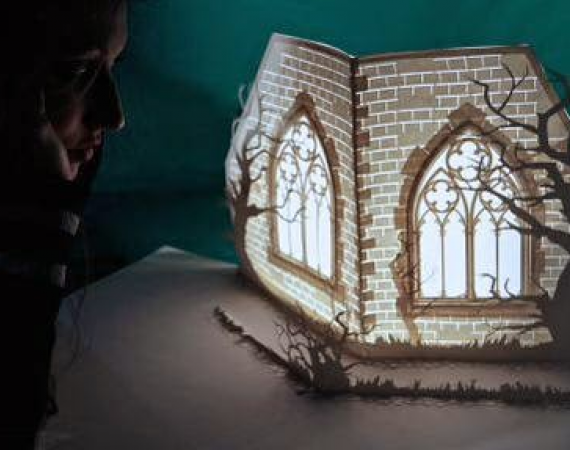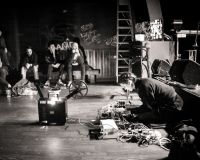Lunchtime talk write-up
Posted on Tue 3 Feb 2015
Theatre Book Lunchtime Talk write-up
On 19 December, we were joined by Davy & Kristin McGuire, Sarah Ellis, Matt Hayler and Karin Brown, who gave a Lunchtime Talk about their REACT Prototype funded project, Theatre Book.

Photo @clarered
Posted by

Jasmine Butt
Jasmine is a musician, synth builder and AV artist who is currently exploring modular synthesis.On 19 December, we were joined by Davy & Kristin McGuire, Sarah Ellis, Matt Hayler and Karin Brown, who gave a Lunchtime Talk about their REACT Prototype funded project, Theatre Book.
Jess, our then Projects Coordinator, wrote this brilliant write-up:
Theatre Book turns a book into an intimate cinematic experience by combining a pop-up format with pico projection. It's perfectly pint-sized Shakespeare with all the delicacy of the text and all the drama of the stage production.
The project is a collaboration between the RSC, Davy & Kristin McGuire, who head an award-winning creative studio that design unique visual experiences through art installations and theatrical projects, Karin Brown of Birmingham's Shakespeare Institute and Matt Hayler, a lecturer in post-1945 literature at the University of Birmingham who studies the relationship between technology, embodiment and reading.
Sarah Ellis from the RSC approached Kristin and Davy about the possibility of creating an intimate experience of Shakespeare, one that drew on the increasing affordances of small, affordable tech.
At the beginning of the talk the team squeezed the audience into the Studio’s meeting room, dimmed the lights and set about providing us with a pretty magical look at their prototype. We were treated to Macbeth in 6 scenes, each a beautifully lit projected vignette that skilfully presented us with a coherent story told in a captivating visual style.
We oohed and aahed throughout. We collectively booed when someone’s mobile went off in the group; such was our disdain for the interruption. For the fifteen minutes or so that we spent with Theatre Book, it was clear just how wide the appeal of this format was.
As Matt Hayler put it ‘At a time when we're worrying again, like Thoreau, about becoming tools of our tools, about giving-in to our technologies, the McGuires remind us that we can make any technology beautiful if we look at and act with it in the right way.’ (Matt has written up his section of the talk here)
One of the biggest challenges the project faced lay in telling Macbeth in 6 scenes without dialogue. Kristin and Davy worked with Karin, who acted as dramaturge, helping them to carefully choose the scenes and ensure that the use of symbols was considered.
Following on from the initial prototyping funding received from REACT, the team are now thinking about whether they should develop a model that they could sell, tour or use in exhibitions. In the future there is the possibility to extend the applications of the book as the tech becomes robust enough to be easily reprogrammable, and of course it would be really interesting to work with students – how do you write for this kind of thing?
Much has been written about the changes to the way we read and consume the written word. Now Theatre Book presents us with exciting possibilities for playwrights, theatre makers and audiences.